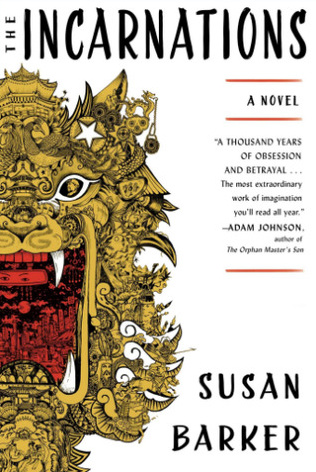

“No matter how dilapidated, scarred and mutilated your body, I have always found you beautiful, for it is the soul beneath I seek.”
― Susan Barker, quote from The Incarnations
“In the end, how much distance lies between the truth and what we believe to be true? Between the things we feel at one time and the things we end up doing?”
― Susan Barker, quote from The Incarnations
“I would have fallen down long ago and let the ground drink the blood of my slit throat, were it not for you. So long as you are by my side, I can endure. You ease the stoned-to-death feeling in my soul.”
― Susan Barker, quote from The Incarnations
“Why does she hate me so much?” I ask. I expect you to say it’s because Long March is a staunch Communist and vigilant with class enemies. But instead you say, “Long March is an unhappy person. People who are unhappy often hurt others.” I consider this, and then say dismally, “But I am unhappy. I don’t go around bullying people.” “That’s because you haven’t had the chance.” Then you are gone. Pedalling up Vinegar Makers Alley to catch up with your friends, leaving me with the pale wisps of your strange remark lingering in the freezing air. *”
― Susan Barker, quote from The Incarnations
“I clench my fist around your stiffness, and your breathing quickens as I draw it back and forth. After your warm, sticky release, I lick my hand clean. Then I bury my face in your wild, stinking hair and hold you. To hold you is to be at one with you. To be at one with the starry cosmos of ancient gods above. As I hold you I will the night never to end. For our oneness fades with the disappearing stars. And by daylight you are other again.”
― Susan Barker, quote from The Incarnations

“A news bulletin on the radio speaks of a public ban on spitting, swearing, smoking and queue-jumping during the Olympics. The Four Pests, the campaign has been called, after the Mao-era policy to eradicate sparrows, mosquitoes, flies and rats. Wang remembers Shuxiang telling him how, during her childhood, gangs of children chased sparrows from tree to tree, banging tin trays until the birds fell out of the sky, too exhausted to beat their wings and fly.”
― Susan Barker, quote from The Incarnations
“What's the good of one person clinging to his morals when everyone else is so corrupt? What's the good of that?”
― Susan Barker, quote from The Incarnations
“What the fuck are you doing with your life?”
“Dating hookers, learning the gay, housing criminals, pissing off my fellow cops, and taking in what everyone says is a cat, but which I’m definitely sure is not a cat. I’m undecided on its actual species. I think it’s a cross between a rat and some kind of alien life—”
― Dani Alexander, quote from Shattered Glass
“They might as well just call them ‘vibrator batteries’ on the package and come with a sticker that says ‘Needs a Good Fuck.”
― Erin Noelle, quote from Metamorphosis
“Sometimes things don’t work out as they’re planned, and there have to be sacrifices in order to make things better again.”
― Gail Tsukiyama, quote from Women of the Silk
“Vote for Toby. Vote for Toby. Hey, baby. How you doin'?" Slight pause. "Vote for Toby.”
― Jennifer Lynn Barnes, quote from Killer Spirit
“I know nothing of any phantom,' replied Aethelfrith. 'What sort of phantom is it presumed to be?'
'Why,' replied the merchant, 'it takes the form of a great giant of a bird. Men hereabouts call it King Raven.'
'Do they indeed?' wondered the friar, much intrigued. 'What does it look like - this giant bird?'
The merchant stared at him in disbelief. 'By the rood, man! Are you dim? It looks like a thumping great raven.”
― Stephen R. Lawhead, quote from Hood
BookQuoters is a community of passionate readers who enjoy sharing the most meaningful, memorable and interesting quotes from great books. As the world communicates more and more via texts, memes and sound bytes, short but profound quotes from books have become more relevant and important. For some of us a quote becomes a mantra, a goal or a philosophy by which we live. For all of us, quotes are a great way to remember a book and to carry with us the author’s best ideas.
We thoughtfully gather quotes from our favorite books, both classic and current, and choose the ones that are most thought-provoking. Each quote represents a book that is interesting, well written and has potential to enhance the reader’s life. We also accept submissions from our visitors and will select the quotes we feel are most appealing to the BookQuoters community.
Founded in 2023, BookQuoters has quickly become a large and vibrant community of people who share an affinity for books. Books are seen by some as a throwback to a previous world; conversely, gleaning the main ideas of a book via a quote or a quick summary is typical of the Information Age but is a habit disdained by some diehard readers. We feel that we have the best of both worlds at BookQuoters; we read books cover-to-cover but offer you some of the highlights. We hope you’ll join us.